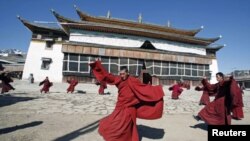U.S. Deputy Assistant Secretary of State for Democracy, Human Rights, and Labor Daniel Baer recently testified before the U.S. Congress on implementing the provisions of the Tibetan Policy Act of 2002.
"The [Obama] Administration’s goals [on Tibet] are twofold: to promote a substantive dialogue between the Chinese Government and the Dalai Lama or his representatives, and to help sustain Tibet’s unique religious, linguistic, and cultural heritages," Deputy Assistant Secretary Baer said. "[We have] urged the Chinese Government to engage in a dialogue with the representatives of the Dalai Lama that will achieve results. We remind the Chinese government that the vast majority of Tibetans advocate non-violent solutions to Tibetan issues and genuine autonomy – not independence or sovereignty – in order to preserve Tibet’s unique culture, religion and its fragile environment."
A critical avenue for implementing the Tibetan Policy Act is support for non-governmental organizations that do work in Tibetan areas. Both the U.S. State Department and the U.S. Agency for International Development support cultural and linguistic preservation, sustainable development and environmental preservation in Tibetan areas in China, as well as assistance to Tibetan refugee communities in India, Nepal, and Bhutan.
The State Department is concerned about the deteriorating human rights situation in China and in the Tibet Autonomous Region and other Tibetan areas. Recent regulations restricting Tibetan language education, strict controls over the practice of Tibetan Buddhism and the arrests of prominent non-political Tibetans reflect the difficult human rights situation in Tibet today.
"The Administration’s engagement on human rights issues in Tibet is high-level and consistent. President Obama and Secretary Clinton have spoken on these points directly to Chinese officials many times," Deputy Assistant Secretary Baer said.
"Our goals – to promote a substantive dialogue between the Chinese Government and the representatives of the Dalai Lama, and to help sustain Tibet’s unique religious, linguistic and cultural heritages – are designed to further the intent of the Tibetan Policy Act of 2002 and create a more stable and more prosperous Tibet where Chinese authorities recognize and foster internationally recognized human rights."
On The Tibetan Policy Act

The U.S. is pushing to to promote a substantive dialogue between the Chinese Government and the Dalai Lama or his representatives, and to help sustain Tibet’s unique religious, linguistic, and cultural heritages,"





















